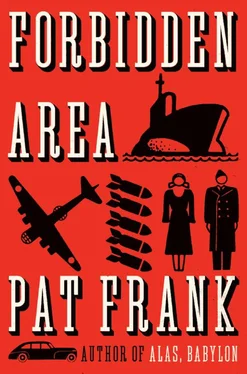“A personal experience?” she asked.
“Yes. It was my squadron. I blew at Okinawa. The burned child dreads the fire.” He touched the scar with his fingers.
She ran her tongue along her lips. “I understand. But suppose the information I requested had been essential to our plans, our forecasts that were coming up? What then?”
“I don’t think you’d get it.”
“Why not?”
“Because you couldn’t do anything with it. Our group has neither responsibility nor authority. It can’t act, but there is always the possibility it might leak.”
She was angry all over again. She stared down into his single, unwavering, disconcerting gray eye. She told herself that this was, after all, an unofficial discussion, and he was a guest in her house, and she must not lose her temper. “Go on,” she challenged.
“What makes you think that in our echelon we are better equipped to divine the intentions of the enemy than the people right at the top, say the National Security Council?”
She was on her feet. “I’ll tell you why! Because we haven’t anything else to do! It is precisely because we have no responsibility or authority, or administration either, to worry about, that we can do this thing. The people at the top have a million things to do. They can’t devote all their time to the enemy.”
“Stop pacing up and down like a leopard,” he said. “Sit down and take it easy.”
“I won’t take it easy. I’m mad. Take the Secretary of Defense. Next to the President and perhaps the Secretary of State he’s the most important man in the country. He runs three departments, each five times as big as General Motors. These departments are designed to do different things in different ways, and there is more rivalry between them than there is, say, between Oldsmobile and Buick. If you were running fifteen General Motors, but each one more complex than General Motors, do you think you could spend all your spare waking hours reading everything that has ever been written, including all the classified files, about the schism between the Army and the Party in Russia, as Simmons did last week?”
“Well, you have a point,” Price said. “That’s something I hadn’t considered.”
“If you don’t believe in the Intentions Group,” she demanded, “why did you join it?”
“If you’ll sit down I’ll tell you. You make me nervous.” She sat down, irritated by the ring of military command in his voice, but obeying nevertheless. “Two reasons,” he said. “First, Keatton asked me to.” Keatton was General Thomas Keatton, Commander of the Air Force. “Secondly, the Air Force hasn’t any place in its T.O. for one-eyed pilots. They don’t let one-eyed pilots fly a B-Nine-Nine, which is what I ought to be doing to earn my pay. But they will let a one-eyed Pilot sit in on the Intentions Group, and I want to stay in the Air Force.”
“You like the Air Force?”
“Maybe it can save us,” he said. “Maybe.” He finished his drink, rose, and stretched. When he stretched, his arms seemed too long for his frame, and altogether he seemed too large and unwieldy for the apartment. His eye took in the opened books on her desk, the notebook and pencils, and the fact that she still wore the gray suit. “Katy,” he said, “why don’t you relax for twenty-four hours?”
“Do you by any chance have a place in the mountains?” she asked.
“No,” he said, looking puzzled. “I don’t have anything but an apartment no bigger than this. But I do have a car and I can take you out to eat. I hate to eat alone.”
“Just wait a minute,” she said, “while I comb my hair.” 6
After that, for more than a year very little happened. It was an era of comparative peace, with no shooting wars such as the half-forgotten wars of Korea and Indo-China. There was much talk of disarmament, although no nation actually disarmed. There was much talk of neutrality, although few governments were actually neutral. Russia was quiet except when internal convulsions, hidden like earthquakes at the bottom of the sea, ruffled the flat surface exposed to men’s eyes.
Americans were concerned with automobile production, the new television shows, the national road-building program, the possibility that antibodies could be stimulated to fight cancer, and the new space satellite.
The Intentions Group concentrated on its impossibly bold divination of events to come.
Katharine Hume dined out quite often, sometimes with Raoul Walback and sometimes with Jesse Price. Since she also entertained them in her apartment, she added a collection of cookbooks to her library.
Stanley Smith enlisted in the Air Force without difficulty, applied for a rating as Food Service Helper, and passed his aptitude tests easily. After ninety days of basic training he was promoted to Airman 2/c and requested and received assignment to the Strategic Air Command.
Henry Hazen survived boot camp, was trained as a radar operator at Quantico, and was then shipped to Camp Pendleton, California, preparatory to overseas duty.
Nina Pope got a job as a stenographer in a St. Augustine real estate office. In mid-November of the following year, when she was dating an automobile salesman and memory of the night in the dunes had dimmed to the proportions of a bad dream, a B-99 on a training flight from Hibiscus Base, Florida, vanished without trace in the Gulf of Mexico.
THE LOSS of a single jet bomber, and the presumed death of its crew, was front page news for only a day, even though the B-99 was the ultimate in military aircraft. The story dropped from the paper entirely after the search was discontinued. So long as men are born unequipped with wings, nature will occasionally slap them from the skies as a reminder that they were not designed to fly.
The Air Force was more than usually concerned, however. The B-99 was a reliable and sturdy aircraft. It could maintain altitude on four of its eight engines. This was the first operational B-99 to be lost.
There was no conceivable explanation for disaster. The plane had left Hibiscus Base with a flight plan calling for a rendezvous with a jet tanker after 3,500 miles of cruising over the Gulf. Its fuel replenished, it would then swing northwest to Salt Lake City and simulate dropping an H-bomb. The people of Salt Lake would know nothing of this macabre experiment, for the B-99 would be at 65,000 feet, out of sight and out of hearing, and would make its bomb run by radar. The contour of Salt Lake, on the radarscope, resembled that of a certain industrial complex locked in a pocket of peaks in the Urals. The crew and plane had accomplished this identical mission without incident a dozen times before. The procedure taxed plane and men to the same extent as an intercontinental bombing mission, come the day.
More than that, there had been no distress calls or warning of trouble. Nineteen minutes out of Hibiscus Base, which lies between Orlando and Tampa, this B-99 had reported that it was at 20,000 feet, on course, speed 550 knots, climbing towards its most efficient ceiling of 55,000, with everything normal. After that, silence—nothing. It was the mystery that annoyed General Keatton. Once, a long time before, he had led his shattered air division back to England with forty-two B-17’s missing from his formations. But he knew what had become of them. He had seen. This way, it was different. Long after it was officially announced that the search had been called off (it would have been cruel to keep the families in suspense because of a million-to-one hope) Keatton kept an air-sea rescue squadron quartering the Gulf. And the Air Force quietly offered a five thousand dollar reward to any fisherman or shrimper who could bring in a bit of wreckage, no matter how minute.
Читать дальше












